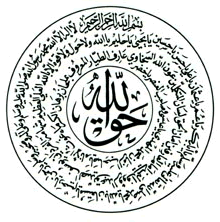
According to Shah Wali Allah, a recognized hadith scholar and eminent Indian Naqshbandi, the biographical literature unequivocally states that Qasim ibn Muhammad ibn Abu Bakr Siddiq could not have met Salman Farsi. Shah Wali Allah’s response is “Allah knows best”. As for the link between Hasan Basri (d. 728 CE) and ‘Ali ibn Abi Talib (d.661 CE) , Shah Wali Allah states the Sufis are convinced that this is a valid link, even though this cannot be proven by hadith scholars. See Shah Wali Allah, “Intibiah fi salasil awliya Allah”, p. 34. Additionally, Bayazid al-Bistami was born in the year 804 CE and died in the year 874 CE, while Ja’far al-Sadiq died in the year 765 CE, and Abul Hasan ‘Ali al-Kharqani, the sucessor of al-Bistami, was born in the year 963 CE. It is historically impossible that Bayazid al-Bistami could have received initiation from Ja’far al-Sadiq, and Abul Hasan ‘Ali al-Kharaqani could have been initiated by Bayazid al-Bistami. Also, Abu ‘Ali al-Farmadi, the sucessor of al-Kharqani was born in the year 1042 CE, while Abul Hasan ‘Ali al-Kharaqani died in the year 1033/4 CE also demonstrating that it is historically impossible al-Farmadi could have received initiation from al-Kharaqani. Receiving directly without a living Guide as a medium, is against the very fibre of Sufism, and its methodology, and even if you claimed these individuals received initiation through Uwaisi transmission, similar to Uwais al-Qarni, the fact remains that al-Qarni lived during the era of the Prophet Muhammad, and as such was a recipient of such transmissions, while these Saints lived in separate eras, calling into question the historic legitimacy of the published silsila of the tariqat.
Q. How do you explain these historical inconsistencies in the published Naqshbandi transmission of initiation (silsilah) tracing back to the Prophet Muhammad?
A. There is more than one line of transmission to the Naqshbandi Golden Chain. In the Qudsiyya, the book of dicta by the spiritual master Khwaja Baha al-Din Shah Naqshband (1318-1389), Khwaja Muhammad Parsa (d. 1460) traced the spiritual genealogy of the Tariqat i-Khwajagan through three parallel lines known as the silsilat adh-dhahab (golden chain)-one leading through Abu Bakr Siddiq, another through ‘Ali ibn Abi Talib, and a third through ‘Ali and his descendents, the biological progeny of the Prophet Muhammad.
According to “Hacegan Hanedani”, by H. L. Shushud, Istanbul 1958, originally published in “Systematics”Volume 6, No. 4 March 1969 by J. G. Bennett, Sultan al-Arifin Bayaid al-Bistami (804-874, 77/78 CE) was initiated by Imam ‘Ali ibn Musa al-Rida (765-818). “The Darvishes: Or Oriental Spiritualism” By John Pair Brown, confirms on p. 141, that Bayazid al-Bistami lived until the year 874/877/878, placing him as an authorized deputy of Imam ‘Ali ibn Musa al-Rida during the life times of the succeeding Imams from the biological progeny of the Prophet Muhammad, namely Imam Muhammad al-Taqi (d.835 CE), Imam ‘Ali al-Hadi (d.868 CE), Imam Hasan al-Askari (846–874 CE), and Imam Muhammad ibn Hasan al-Mahdi (869-), whose birth was documented by Khwaja Muhammad Parsa in Fasl al-Khitab [Arabic]: Fadhail Khulafa wa Ahlul Bayt, on p. 592.
Bayazid al-Bistami was a follower of the school of Imam Ja’far al-Sadiq (702–765), not his direct student. The book ‘Religion and Identity in South Asia and Beyond: Essays in Honor of Patrick Olivelle’ lists the historical transmission of spiritual knowledge tracing back to Sultan al-Arifin Abu Yazid al-Bistami through Khwaja Abul Hasan ‘Ali al-Kharqani as the following on p. 292,
1.Abu Yazid al-Bistami (804-877/78)
2.Khwaja Muhammad al-Maghrabi (864-)
3.Khwaja al-’Arabi Abu Yazid al-‘Ishqi Iraqi (917-)
4.Khwaja Abul Mudhaffar at-Turk at-Tusi (938-)
5.Khwaja Abul Hasan ‘Ali ibn Ja’far ibn Salman al-Kharqani (963-1034)
Among other books, in the Maqamat Mazhari, Shah Ghulam ‘Ali Mawlana ‘Abd Allah ad-Dahlawi (1743–1824), the teacher of Mawlana Khalid al-Baghdadi (1779–1827), documented Khwaja Abul Qasim al-Jurgani (-1058) as the link connecting Khwaja Abu ‘Ali al-Farmadhi (1042/3-1085) to Khwaja Abul Hasan al-Kharqani (d. 1034).
The following is a more historically accurate transmission of the Golden Chain down to the venerable Khwaja Baha al-Din Naqshband Bukhari:
1.Abu Yazid al-Bistami (804-877/78)
2.Khwaja Muhammad al-Maghrabi (864-)
3.Khwaja al-‘Arabi Abu Yazid al-‘Ishqi Iraqi (917-)
4.Khwaja Abul Mudhaffar at-Turk at-Tusi (938-)
5.Khwaja Abul Hasan ‘Ali ibn Ja’far ibn Salman al-Kharqani (963-1034)
6.Khwaja Abul Qasim al-Jurgani (-1058)
7.Khwaja Abu ‘Ali al-Farmadi (1042/3-1085)
8.Khwaja Abu Yaqub Yusuf al-Hamadani (1048/49-1141)
9.Abul Abbas, al-Khidr (-present)
10.Khwaja ‘Abdul Khaliq al-Ghujdawani (-1180)
11.Khwaja ‘Arif ar-Riwakri (-1219)
12.Khwaja Mahmud al-Anjir al-Faghnawi (-1315)
13.Khwaja ‘Ali ar-Ramitani (1198-1315/1321)
14.Khwaja Muhammad Baba as-Samasi (-1354)
15.as-Sayyid Amir Kulal (-1370)
16.as-Sayyid Khwaja Baha al-Din Shah Naqshband Bukhari (1318-1389)
And Allah Knows Best!
Sayyid Ahmed Amiruddin

